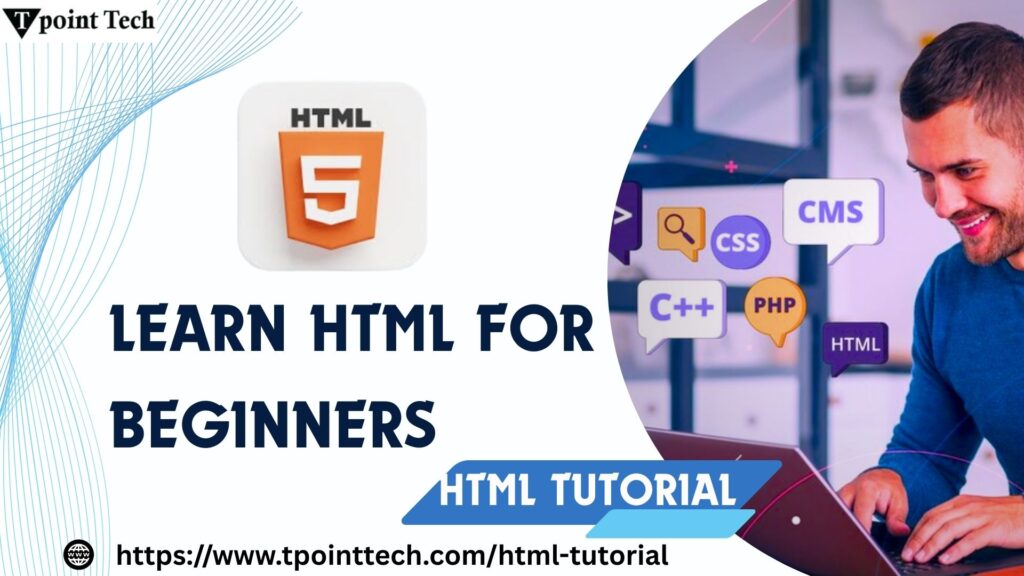If you’ve ever wondered how websites are built, you’re in the right place. HTML, or HyperText Markup Language, is the foundation of every web page. Whether you’re hoping to start a new career, build your own website, or simply understand how the internet works, HTML is the perfect place to start.
For those searching to learn HTML for beginners, this guide offers a friendly and simple introduction to web basics. You don’t need any technical experience or a programming background—just curiosity and a willingness to learn.

What Is HTML?
HTML is the standard language used to create web pages. It helps organize content like text, images, links, and buttons on a website. Think of HTML as the building blocks of the web—without it, websites wouldn’t exist in the way we see and interact with them.
HTML doesn’t control how things look (that’s what CSS is for), and it doesn’t make websites interactive (that’s JavaScript’s job). But HTML is the structure, the skeleton, the backbone of every site. That’s why it’s essential to learn it before diving into more advanced topics.
Why Beginners Should Start With HTML
When learning any new skill, it’s important to start simple. HTML provides an accessible introduction to the world of web development because it’s easy to understand, yet powerful enough to build real websites. That’s why the best way to learn HTML for beginners is to begin with the basics—understanding how elements are placed on a page, how headings and paragraphs are structured, and how links connect different sections or websites together.
By learning HTML, you’re not only gaining a technical skill; you’re also opening the door to creativity. With just a few simple concepts, you can start shaping your own web pages, telling your story, or sharing your ideas online.
Four Key Concepts Every Beginner Should Know
To help simplify your learning journey, here are four fundamental concepts you’ll come across when you begin your HTML adventure:
1. The Structure of a Web Page
Every web page has a basic structure made up of elements. These elements are like building blocks that define where content goes and what type it is. For example, there are elements for text, images, lists, and links. Understanding this structure is the first step toward mastering HTML.
2. Organizing Content
A well-organized web page is easy to read and navigate. As you learn HTML for beginners, you’ll discover how different tags are used to create sections, headings, and paragraphs. This helps structure the content clearly for both readers and search engines.
3. Linking Pages and Resources
One of the most powerful features of the web is the ability to connect pages together. HTML allows you to link from one page to another or even to external websites. Learning how links work is crucial for building navigation and enhancing user experience.
4. Adding Media
HTML isn’t just for text. It also allows you to add images, videos, and other media to your page. These elements help bring your content to life and make your website more engaging. Knowing how to include and organize media is an essential part of the learning process.
The Best Way to Learn HTML for Beginners
So, what’s the best way to learn HTML for beginners? It comes down to practice, simplicity, and consistency.
Start by focusing on the core concepts mentioned above. Don’t worry about learning everything at once. HTML is a language that rewards practice. As you build small pages or projects, you’ll naturally begin to understand how elements work together.
Use simple, real-world examples. Try creating a basic web page about your hobbies, your favorite books, or even a personal bio. As you build, you’ll start to see how different HTML elements are used to create a well-structured and readable page.
It’s also helpful to set small goals. Each time you learn a new tag or concept, try applying it to a new page or improving an existing one. Over time, your skills will grow, and HTML will start to feel more natural.
Why Learning HTML Is Worth It
Even if you don’t plan on becoming a professional web developer, learning HTML is still incredibly valuable. It gives you a better understanding of how websites function, improves your digital literacy, and allows you to create content online more effectively.
Many jobs today, even non-technical ones, benefit from basic HTML knowledge—especially in areas like marketing, design, education, and content creation.
In Conclusion
HTML may seem intimidating at first, but it’s one of the most beginner-friendly skills you can learn. By starting with the basics and practicing regularly, you’ll gain the confidence to build your own web pages and explore further into the world of web development.
So if you’ve been searching for the best way to learn HTML for beginners, this is your sign to begin. Embrace the simplicity of HTML, take your time, and enjoy the journey of creating something truly your own—one tag at a time.
Visit for related programming languages, Python tutorial


